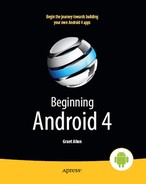Chapter 49
Where Do We Go from Here?
Obviously, this book does not cover everything. And while your primary resource (besides the book) is the Android SDK documentation, you are likely to need information from additional sources.
Searching online for “android” and a class name is a good way to locate tutorials that reference a given Android class. However, bear in mind that Android’s pace of change means tutorials written even only a few years ago are probably written for much earlier SDK versions and, as such, will require considerable adjustment to work properly in current SDKs.
Instead of randomly hunting around for tutorials, you can use some of the resources outlined in this chapter to narrow your search.
Questions, Sometimes with Answers
The official places to get assistance with Android are the Android Google Groups. With respect to the SDK, there are two to consider:
- Android Developers (
groups.google.com/group/android-developers), for SDK questions and answers - Android Discuss (
http://groups.google.com/group/android-discuss), designed for free-form discussion of anything Android-related, not necessarily for programming questions and answers
You might also consider the following resources, particularly StackOverflow, which is increasingly considered the best place to receive help:
- StackOverflow’s
androidtag (http://stackoverflow.com/questions/tagged/android) - The Android tutorials and programming forums at
www.anddev.org - The Open Mob for Android wiki (
http://andmob.wikidot.com/) - The
#android-devIRC channel on freenode (http://freenode.net/) - The Android Forum at JavaRanch (
www.coderanch.com/forums/f-93/Android)
It is important, particularly for StackOverflow and the Google Groups, to write informative questions. Following are some tips for writing effective questions:
- Include relevant portions of the source code (e.g., the method in which you are getting an exception).
- Include the stack trace from LogCat, if the problem is an unhandled exception.
- On StackOverflow, make sure your source code and stack trace are formatted as source code; on Google Groups, consider posting long listings on
http://gist.github.comor a similar code-paste site. - Explain thoroughly what you are trying to do, how you are trying to do it, and why you are doing it this way (especially if you think your goal or approach may be a little offbeat). Be prepared for people to try to steer you toward a completely different approach rather than actually trying to help you solve your current problem. Consider other approaches, but be wary of compromising the integrity of your vision.
- On StackOverflow, respond to answers and comments with your own comments, addressing the person using the
@syntax (e.g.,@CommonsWare), to maximize the odds you will get a reply. - On the Google Groups, do not “ping” or reply to your own message to try to elicit a response until a reasonable amount of time has gone by (e.g., 24 hours).
Heading to the Source
The source code to Android is now available, albeit several versions behind the current Android 4.0 release. Mostly, this is for people who are looking to enhance, improve, or otherwise fuss with the insides of the Android operating system. But it is possible that you will find the answers you seek in that code, particularly if you want to see how some built-in Android component does its thing.
NOTE: Google has promised it will release the source code for Android 4.0, Ice Cream Sandwich, in the near future. Such a release is becoming increasingly important, as the existing version available on http://source.android.com is 2.3, which is growing long in the tooth. As previously stated by Google, the source for the 3.x versions is unlikely ever to be released, as 4.0 is the preferred merged code base for all future editions.
The source code and related resources can be found at http://source.android.com, where you can do the following:
- Download or browse the source code
- File bug reports against the operating system itself
- Submit patches and learn about the process for how such patches are evaluated and approved
- Join a separate set of Google Groups for Android platform development
Rather than download the multigigabyte Android source code snapshot, you may wish to use Google Code Search (www.google.com/codesearch) instead. Just add the package:android constraint to your search query, and it will search only in Android and related projects.
Getting Your News Fix
Ed Burnette, a nice guy who happened to write his own Android book, is also the manager of Planet Android (www.planetandroid.com), a feed aggregator for a number of Android-related blogs. Subscribing to Planet Android’s feed enables you to monitor quite a few Android-related blog posts, though not exclusively related to programming.
To try to focus more on programming-related, Android-referencing blog posts, you can search DZone (www.dzone.com) for “android” and subscribe to a feed based on that search.
